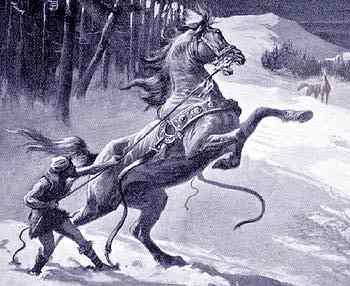 |
| Loki and Svadilfari by Dorothy Hardy public domain |
I often wonder about the implications of these rituals when considering the story of the walling of Asgard. Told in the Gylfaginning of the Prose Edda and the Völuspá of the Poetic Edda, the tale recounts a giant who comes to Asgard, offering to build an impenetrable wall around it in exchange for the hand of Freya, and the sun and the moon. The Gods give him a time limit that seems impossible, but the giant comes close to completing his task. Loki is sent to stop him and succeeds - and for the giant's "failure", Thor kills him with his hammer. Of course, that's a very concise version, but it's the very beginning that's of interest to me.
The being that walls and encircles Asgard, certainly a holy and protective function, is not one of the Aesir. The threshold of the home of the Gods is not established by its inhabitants or a sacred, appointed spirit - instead, it is built by a giant, a member of the apparent "savage" race that the Gods are trying to keep out. There's no evidence either here or in later writings that the giant is attempting to trick the Aesir with shoddy building or a hidden door so he can later attack - he is the honorable one in this exchange, serving a sacred function for the Gods who unfortunately prove themselves unworthy.
Another Jotun, a giantess named Gerd, is said to have later married the God Frey and is listed by Snorri as one of the Asynjur. The etomology of Her name is an interesting one, with many concluding it means either 'walled field' or that it simply denotes the action of walling (from Rudolf Simek's Dictionary of Northern Mythology). How fascinating that She also is so linked to this bounding of space, separating the inside from the outside, while She is really a product of both. While of course I honor Gerd in my garden, I see Her also as a deity of these boundaries, and I offer to Her when I ward my doorways and the edges of my land.
It's clear that doorways and boundaries were very important to the ancient Indo-European peoples. How interesting that two spirits strongly associated with these boundaries are giants, so often overlooked or pushed aside in modern Heathenry.





